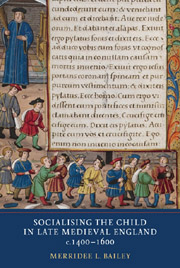Book contents
- Frontmatter
- Contents
- Acknowledgements
- Abbreviations
- Transcription conventions
- Introduction
- 1 Courtesy Poems
- 2 Readers
- 3 Virtue and Vice
- 4 Sixteenth-Century Books
- 5 The School
- Conclusion
- Appendix A Appendix A: English Vernacular Courtesy Poems
- Appendix B Incunabula
- Appendix C Sixteenth-Century Books
- Appendix D Educational Sources
- Bibliography
- Index
- YORK MEDIEVAL PRESS: PUBLICATIONS
Conclusion
Published online by Cambridge University Press: 05 April 2013
- Frontmatter
- Contents
- Acknowledgements
- Abbreviations
- Transcription conventions
- Introduction
- 1 Courtesy Poems
- 2 Readers
- 3 Virtue and Vice
- 4 Sixteenth-Century Books
- 5 The School
- Conclusion
- Appendix A Appendix A: English Vernacular Courtesy Poems
- Appendix B Incunabula
- Appendix C Sixteenth-Century Books
- Appendix D Educational Sources
- Bibliography
- Index
- YORK MEDIEVAL PRESS: PUBLICATIONS
Summary
Parents and adults, the State and the Church were obsessively preoccupied with the behaviour and conduct of children in medieval and early modern England. They saw childhood not as a spontaneous and natural time of life, but rather one to be structured, developed and moulded. At the core of their beliefs was the staple that the process of socialisation was necessary to produce a well-behaved child and then eventually a well-adjusted adult who had thoroughly absorbed the current conventions of society and could meet its demands.
This book's chronology, moving from the late medieval to the early modern period, shows this fundamental belief was never shaken. Rather, it was the manner in which socialisation was achieved and perceptions of what was important that were subject to revision and amendment. A shift in expectations is suggested by the evidence rather than radical new approaches to the socialisation of children. Key issues in upbringing, such as obedience, meekness and duty, remained consistent. More compellingly, the evidence examined in this book suggests a cyclical tendency in social norms; courtesy appears to lose ground to morality in the late fifteenth century but is then reinvented in sixteenth-century books. These books reminded people that observable conduct and the appearance of good behaviour still held social value and importance. Schools also continued to emphasise basic courtesy and hygiene while at the same time calling attention to higher moral and religious values.
- Type
- Chapter
- Information
- Socialising the Child in Late Medieval England, c. 1400–1600 , pp. 194 - 200Publisher: Boydell & BrewerPrint publication year: 2012



